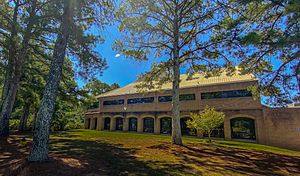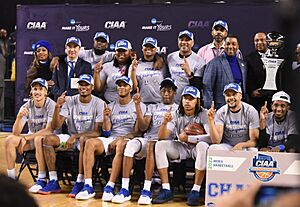Fayetteville State University facts for kids
 |
|
|
Former name
|
Howard School (1867–1877) State Colored Normal School (1877–1939) Fayetteville State Teachers College (1939–1963) Fayetteville State College (1963–1969) |
|---|---|
| Motto | Res Non Verba (Latin) |
|
Motto in English
|
"Deeds not Words" |
| Type | Public historically black university |
| Established | November 29, 1867 |
|
Parent institution
|
University of North Carolina |
| Accreditation | SACS |
|
Academic affiliations
|
TMCF |
| Endowment | $24.8 million (2020) |
| Chancellor | Darrell T. Allison, J.D. |
|
Academic staff
|
328 (Fall 2011) |
|
Administrative staff
|
581 (Fall 2011) |
| Students | 6,748 (Fall 2021) |
| Undergraduates | 5,557 (Fall 2021) |
| Location |
,
,
United States
|
| Campus | Midsize city, 200 acres (0.81 km2) |
| Newspaper | The Voice |
| Colors | Blue and white |
| Nickname | Broncos |
|
Sporting affiliations
|
NCAA Division II — CIAA |
| Mascot | Mr. Bronco |
 |
|
Fayetteville State University (FSU) is a public university in Fayetteville, North Carolina. It is a historically black university. This means it was founded to educate African American students. FSU is part of the University of North Carolina System. It is also part of the Thurgood Marshall College Fund.
Contents
History of FSU
Early Beginnings: The Howard School
Fayetteville State University has a long history. It is the second oldest state-supported school in North Carolina. After the Civil War in 1865, education became very important for African Americans in Fayetteville. Two schools, Phillips and Sumner, were started for younger students.
In 1867, these schools joined together to form the Howard School. This school was named after General Oliver O. Howard. He helped build the school. Seven important African American men bought land for the school. They wanted to make sure local Black youth could get an education.
Becoming a Teacher Training School
In 1877, North Carolina passed a law. It created the first school to train African American teachers. The Howard School was chosen because it had a good record. It became the State Colored Normal School. This made it the first state-supported school in the South to train African American teachers.
Growth Under Dr. Ezekiel Ezra Smith
In 1883, Dr. Ezekiel Ezra Smith became the school's leader. He worked there for 50 years. During his time, the school moved to a new, bigger location. He even gave some of his own land to the school. This helped the campus grow to 92 acres.
By 1929, the school stopped offering high school classes. It focused only on college-level education. Dr. Smith retired in 1933.
Becoming a College and University
After Dr. Smith, Dr. J. Ward Seabrook became president. In 1939, the school became Fayetteville State Teachers College. It started offering four-year degrees in education.
Later, in 1959, Dr. Rudolph Jones was president. The school began offering degrees in other subjects, not just teaching. In 1963, it changed its name again to Fayetteville State College. More buildings were added as more students enrolled.
In 1969, Dr. Charles Lyons Jr. became president. The college was officially renamed Fayetteville State University. It became a regional university. In 1972, FSU joined The University of North Carolina System. Dr. Lyons became its first chancellor. Under his leadership, FSU started offering many different bachelor's and master's degrees. It also created programs for military personnel.
Expanding Programs and Leadership
In 1988, Dr. Lloyd Hackley became chancellor. He worked to add more degree programs. In 1994, FSU started its first doctoral program. This was in Educational Leadership. Dr. Hackley also helped raise money for student scholarships.
In 2003, Dr. Thelma Jane "T.J." Bryan made history. She became the first female chancellor of FSU. She was also the first African American woman to lead a UNC school. Under her, FSU added many new programs. It also became a leader in online learning.
Dr. James Anderson followed Dr. Bryan in 2008. Dr. Peggy Valentine was Acting Chancellor in 2019. In March 2021, Darrell T. Allison became the 12th Chancellor of Fayetteville State University.
Academics at FSU
Fayetteville State University wants to give its students a great education. It offers a strong foundation in liberal arts. It also provides special training for different jobs.
The university offers bachelor's degrees in 43 subjects. It has master's degrees in 23 areas. There is also one doctoral degree in educational leadership. The university is officially approved by the Southern Association of Colleges and Schools.
The Charles W. Chesnutt Library
The Charles W. Chesnutt Library helps students with their studies. It also serves as a cultural resource for the community. The library is named after Charles W. Chesnutt. His father was one of the university's founders.
The library has many books and other materials. It has over 192,000 books. It also has many microfilms, microfiches, and newspapers. The library is part of a program that provides government documents.
The library has a "Digital Commons." This is a place for research and sharing academic work online. The fourth floor has special collections. These include old university records and papers from important people. For example, it has letters from Charles Waddell Chesnutt. It also has papers from Dr. Ezekiel Ezra Smith.
In 2022, the library changed some of its services. It added a "One Stop for Advising and Student Success." It also created an "Adult Learning Center." The library received a $20,000 grant in 2022. This money was used to buy laptops for students. The Chesnutt Library is a member of the HBCU Library Alliance.
Journal of Research Initiatives
Fayetteville State University publishes a journal. It is called the Journal of Research Initiatives (JRI). This journal comes out twice a year. It shares new research and ideas. Dr. Linda Wilson-Jones edits this journal.
Student Life at FSU
Student Organizations
Students at Fayetteville State University can join many groups. There are over 78 student organizations. These include sororities and fraternities. Students can also play sports like flag football, basketball, and soccer. New groups are added every year.
Athletics
Fayetteville State University has 10 NCAA sports teams. The men's teams play football, basketball, cross-country/track, and golf. The women's teams play basketball, volleyball, softball, cross-country/track, tennis, and bowling. The university is part of the Central Intercollegiate Athletic Association (CIAA).
Student Media
Bronco-iRadio is the student online radio station. FSU students run and manage it.
Students also publish a newspaper called The Voice. It comes out every two weeks. It covers news about student life, arts, entertainment, and sports.
Performing and Fine Arts
Fayetteville State University has a strong arts program. It has hosted many talented artists. These include Dance Theatre of Harlem and Take 6.
Notable Alumni
- Chris Armstrong – former professional football player
- Darrell Armstrong – former professional basketball player and coach
- Jim Bibby – former MLB baseball player
- Affion Crockett – actor, writer, comedian
- Brasheedah Elohim – professional women's basketball player
- Algeania Freeman – academic leader
- Michele S. Jones – first woman to reach a high position in the United States Army Reserve
- Marvin W. Lucas – member of the North Carolina General Assembly
- Richard Medlin – former NFL football player
- Sylvester Ritter – former NFL player and professional wrestler (known as "Junkyard Dog")
- Johnathan Michael Porter (Blueface) – Rapper and former quarterback (did not graduate)
- Joshua Williams – NFL football player
 | Calvin Brent |
 | Walter T. Bailey |
 | Martha Cassell Thompson |
 | Alberta Jeannette Cassell |



